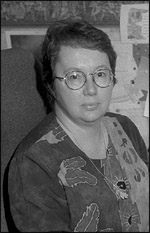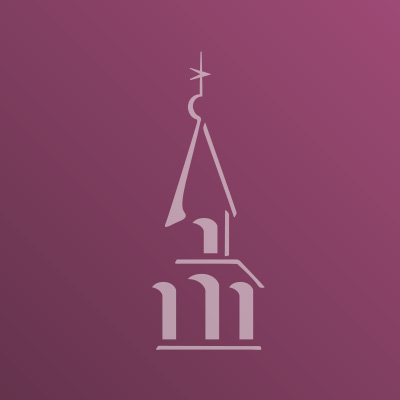The Reverend Ron Fletcher is a United Church of Canada minister living in Kerrobert, Saskatchewan, a small town in the western sprawl of the province close to the Alberta border. His wife, the Reverend Kathy Fletcher, is a United Church minister in Regina, some 320 miles (480 kilometers) away, a five-hour drive across the prairie. One of the distinctive features of their long-distance marriage is that they are both enrolled in the same internet course offered as part of the doctor of ministry program at St. Stephen’s College, a UCC theological college at the University of Alberta in Edmonton. Edmonton is 270 miles (430 kilometers) from Kerrobert in the other direction.
“E-mail is really important to us,” says Ron Fletcher. “We used to run up huge phone bills.” Now internet education has allowed both busy United Church ministers to pursue post-graduate studies while serving disparate pastoral charges. Ron has worked out a deal with his congregation to work steadily, then take five consecutive days off every three weeks to spend time with Kathy in Regina.
Internet education represents a great leap forward for Kathy, who says she didn’t even own a computer when she completed her master of divinity degree at Queen’s Theological College, Kingston, Ontario. “It’s my husband who has always been a technonut.”
But now Kathy says studying on the internet is an integral part of the D. Min. program she’s about half way through. She combines internet courses with intensive one-week courses and colloquiums. She is now preparing a dissertation proposal. St. Stephen’s requires all its D. Min. students to take a course in thesis writing, also offered over the internet.
Ron Fletcher says frankly he wouldn’t be able to complete doctoral studies without the internet courses. “The old correspondence courses were just not as effective.” On-line courses offer mature students who are already working professionals a chance they wouldn’t otherwise have to complete further studies. “It’s amazing. I’m finding a lot of students, like me, are in the over-50 age group.”
 |
| St. Stephen’s internet courses are one way to overcome Canada’s vast distances. The maps show the Fletchers’ locations in Kerrobert and Regina relative to the school in Edmonton.
Click here to view larger map. |
St. Stephen’s is one of the pioneers in internet theological education in Canada. The calendar posted on its web site offers thirteen courses ranging from qualitative research to feminist theology (see the end of this article). Internet courses are offered for credit towards master of theological studies, master of arts in spirituality and liturgy, and master of arts in social transformation—all degree programs at St. Stephen’s—as well as the doctor of ministry.
Course registration costs $340 (Canadian), with a $200 (Canadian) fee to audit—the same as for on-campus courses. Students are required to have a PC 486 or Macintosh Power PC, an e-mail program, and a web browser. Most on-line courses run from October 1 to May 31 of the following year, although students may start at any time at the discretion of the instructor.
Theology courses offered on the internet reach a much wider and more diverse student population than residential programs, says St. Stephen’s principal Chris Levan. He recalls two sisters who lived a thousand miles apart and decided to take the same course from St. Stephen’s so they’d have something in common to talk about. Another student from London, England, took a course in spirituality so he could study while he traveled.
Levan, who himself teaches a course called Introduction to Christian Scriptures, says the internet course offerings at St. Stephen’s simply offer another method of delivering distance education for a college which has already been a leader in that field. The school’s forty-one one-week intensive courses offer thirty-nine and a half hours of classroom instruction that complement pre-course and post-course reading and assignments.
While critics might question the academic standards of theological courses offered on line, Levan says St. Stephen’s College believes the quality is there. “Obviously some people will view this with suspicion. There’s always resistance to change.”
St. Stephen’s has demonstrated its confidence in the integrity of internet courses by offering two required doctoral courses in qualitative research and program evaluation.
 |
| St. Stephen’s principal, Chris Levan, shown here with Edmonton skyline behind him, considers internet courses just one more method of delivering a quality education.
Photograph by
|
Students’ Evaluations
The most eloquent testimony comes from the students themselves. Edwin Smith, an Episcopal priest and former university administrator from Oshkosh, Wisconsin, who has three degrees as well as post-doctoral work, says his course in congregational transformation from St. Stephen’s was one of the finest he’s taken.
“The syllabus for that course was one of the most detailed and thorough I’ve seen. There is no question of its credibility. I’d stack it up with any course I’ve ever taken, and I’ve never had such quick response time from an instructor.”
Smith, former assistant chancellor at the University of Wisconsin, Oshkosh, says opposition to internet courses is short-sighted. “I’ve told my former colleagues in the academy they have to wake up. Lots of folks are interested in doing graduate work through the internet. It’s one more thing in our educational tool kit. It won’t replace the classroom, but I’ve always believed the traditional classroom lecture setting is overrated.
The advantage for students like Smith is that internet courses offer a relatively cheap method of doing graduate level courses without the cost of transportation and accommodation required for residential courses. Students can work at their own speed. Smith enrolled in December for a course which usually starts in October. He says he had to work hard to complete the required course of study by the end of May. “It’s ideal for self-starters, especially for adult learners.”
The instructor who taught Smith, but has never met him, is Clair Woodbury, a United Church minister and educator who specializes in congregational transformation. Woodbury recalls chatting back and forth with Smith over the internet. “You really feel you know these folks.”
 |
| Instructor Clair Woodbury predicts increasing technological sophistication as student and faculty comfort levels rise.
Photograph by |
Woodbury offers the ten-module course in congregational transformation, as well as a thesis writing course that is compulsory for doctoral students. In the congregational transformation course, students are led through a process that identifies congregational identity, vision for the future, and values, and concludes with a major project in the form of a fifteen-page congregational revitalization plan.
So far the St. Stephen’s courses are offered at a fairly minimal level of internet sophistication. Woodbury says one of the challenges has been to get some students comfortable with the basics of doing an internet course including e-mail with attachments. “We certainly haven’t been using more elaborate Java script or assuming students have sound cards.”
That means most courses are simply offering text lectures with assignments and readings, as well as links to other internet sites. Instructors like Woodbury communicate with students using e-mail rather than using chat rooms, or other interactive methods.
But Woodbury predicts use of the internet on a more sophisticated level for graduate education in theology will increase. For him, the comfort level has increased dramatically. “Three years ago I hardly knew what the internet was.” Now he and other members of a D. Min. committee are doing a paperless review of one student’s work, with each chapter filed as an e-mail attachment. “I often read on screen now and make comments and don’t have to print anything out.”
For Dale Breitkreutz, who teaches an on-line course on Christian ethics at St. Stephen’s, the internet is an “exhilarating” opportunity to provide new methods of distance education. Breitkreutz has been working in the field since 1994—first in conventional correspondence courses, then, in 1995, helping St. Stephen’s develop one of its first internet courses.
He says if it’s used properly, internet technology can facilitate communication between students and provide an opportunity for conversation between students who otherwise wouldn’t meet. With Canada being the second largest country in the world in geographical size, internet courses bring students together from far-flung places. “I have had students from Toronto, Moncton, New Brunswick (in the Maritime provinces on Canada’s east coast), Saskatchewan, and Alberta.”
Teachers’ Concerns
 |
| Ron Fletcher enjoys the informality of his small town parish while his wife Kathy (below) has a more urban ministry.
Photograph by |
For faculty members teaching on-line courses, the workload is a little less once the course is prepared and the learning modules posted on the internet. Breitkreutz says on-line courses are labor-intensive in preparation, but the rest of the work is much more spread out then for conventional classroom courses. “None of it seems like work for me,” he says. “It’s like I’m conducting a conversation with a lot of individuals by e-mail. It’s nothing like when you have a class with forty papers to mark all at the same time. There’s a regular flow.”
Breitkreutz says his e-mail volume varies. While all students file assignments by e-mail, some are in more regular contact than others with questions.
Although internet courses may reduce workload for faculty at St. Stephen’s, it may also mean a reduction in earnings depending on enrollment patterns. Instructors are paid on a per-student basis, and it takes quite a few internet enrollees to equal one classroom of 40 students.
The ethics course Breitkreutz teaches, titled “Dirt, Greed and Sex: Introduction to Christian Ethics,” is a required course for many students pursuing the non-ordained diaconal form of commissioned ministry in the United Church of Canada. (The course takes its name from a similarly titled book by L. William Countryman that was published in 1988.) Breitkreutz, who also teaches at Augustana University College in Camrose, Alberta, where he lives, has had a steady stream of three to five students taking the course.
He finds teaching on the internet as convenient for the professor as for the student. “I can go down to my study anytime and collect my e-mail and respond to it.”
 |
| Kathy Fletcher
Photograph by |
Still Breitkreutz thinks theological educators have to constantly search for ways to improve their offerings. His son, a sixth-grade student, is doing his courses by internet from the Edmonton Public School Board. The technical level of sophistication is much higher since the board has more technical support than a theological college like St. Stephen’s has to offer its faculty in designing internet courses.
While internet education won’t ever replace residential study, Breitkreutz predicts it will have a major impact on adult theological education. “For many students it’s ideal since they can’t leave their employment and their family obligations to go back to school for an extended period. This is great for second-career people.”
For Kathy Fletcher, who is preparing a dissertation proposal on her area of interest, healing in the church, the internet courses have been a “tremendous” chance to combine study with her pastoral duties at Eastside United, in Regina. “I’ve connected with people I wouldn’t normally have connected with.” Several of the students she’s worked with on line live thousands of miles away on Canada’s east coast.
As well, Kathy has found that her professors have been very accessible by phone or e-mail, so there hasn’t been any feeling that she’s been lacking contact with her instructors. Adds husband Ron: “How else could we do doctoral work while working when we only get about three clear weeks off a year? On-line courses seem like the only effective way.”
Internet Courses at St. Stephen’s College
- Feminist Theology
Classical Christian doctrines and their reconfiguration in feminist theological terms; the hermeneutic of suspicion; alternatives to patriarchal theology. - Dirt, Greed and Sex: Introduction to Christian Ethics
Basic principles of Christian ethics. Students have to sort through the demands and counter-demands of sociopolitical and economic circumstances and make judgments. - Tell Me the Stories of Jesus: Introduction to Christian Scriptures
This explores the twenty-seven books of the New Testament to enable a more thoughtful reading of the biblical texts through an understanding of their historical roots and literary structure. - Introduction to Hebrew Scriptures
This includes an examination of the Hebrew scriptures in translation, as well as discussion of what the texts meant in their original context. Students will be, in effect, putting on ancient garb and ancient ways of thinking about, hearing, and responding to the text. This will help enable discussion of twentieth-century interpretation of Hebrew scriptures. - A Practical Guide to Congregational Transformation
This helps students analyze how a congregation can thrive in today’s context. It includes tools to analyze a congregation, identify leadership requirements, create effective management structures, and introduce congregational transformation strategies. - Encounters with Suffering: A Quest for a Moral Vision
Theological reflections on the capacity of the human spirit to sustain hope in a broken world. The course includes the theological dimensions of suffering and the opportunity to offer active solidarity with those who suffer. - Theology and Ecology: Ethics and Earth Community
This explores theories about ideas and practices which contribute to earth’s environmental challenges and what alternatives can contribute to solutions based on an understanding of Christian doctrine and ethics. - Theological Currents in Selected Canadian Novels
Using five Canadian novels and short theological writings, students participate in a dialogue about elements of Canadian literature and Christian theology. - Taking a Chance on God: Major Themes in Christian Spirituality
This provides a context for individuals to explore, examine, and, hopefully, better understand the ups and downs of their spiritual journey in relationship to past and present writers in the Christian tradition. - Qualitative Research
This is a graduate course to help students prepare to undertake a qualitative research study. It covers all aspects of research from the development of the questions to the writing of the final report study. - Program Evaluation
This offers graduate students a combination of approaches and practices in program evaluation, including applications in institutional and private settings. - Sacred Spaces and Sacred Places
This examines the definition of sacred places and sacred spaces in a variety of cultures and times. Students will be asked to consider what is sacred in their own lives. Examples from sacred art and music enhance the readings. - Writing a Thesis with Substance and Style
This non-credit course, required for all students doing master’s programs at St. Stephen’s, is designed to help students achieve clarity in their writing. It looks at thesis expectations and helps sharpen skills in editing and concept development.



























